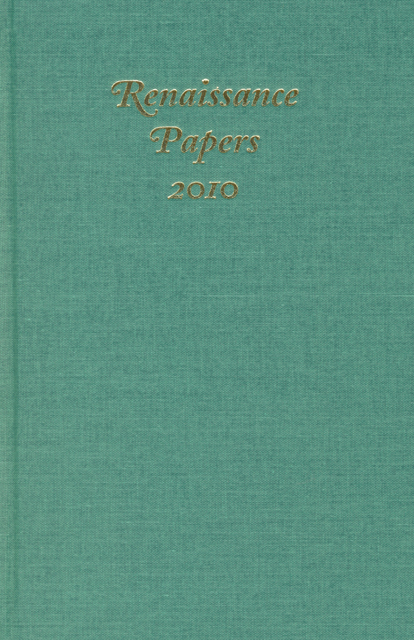Book contents
- Frontmatter
- Contents
- Renaissance Papers
- Aretino’s Life and His Afterlife in England
- Mixing Genres in George Peele’s David and Bethsabe
- Royal Prerogative versus the Common Law in A View of the Present State of Ireland and The Faerie Queene, Book 5
- The Limits of Clowning in the Age of Marprelate: The Anti-Martinist Tracts and 2 Henry VI
- Shakespeare’s Iago
- Francesco Patrizi da Cherso, Caravaggio, and the Metaphysics of Light
- Being John Donne in 1602
- The Problem of the Human in Sir Francis Bacon
- The Glamorous Echoes of Godly Print
- “More cullors than the Rainbowe caries”: Catholics, Cosmetics, and the Aesthetic Economy of Protestant England
Royal Prerogative versus the Common Law in A View of the Present State of Ireland and The Faerie Queene, Book 5
Published online by Cambridge University Press: 10 February 2023
- Frontmatter
- Contents
- Renaissance Papers
- Aretino’s Life and His Afterlife in England
- Mixing Genres in George Peele’s David and Bethsabe
- Royal Prerogative versus the Common Law in A View of the Present State of Ireland and The Faerie Queene, Book 5
- The Limits of Clowning in the Age of Marprelate: The Anti-Martinist Tracts and 2 Henry VI
- Shakespeare’s Iago
- Francesco Patrizi da Cherso, Caravaggio, and the Metaphysics of Light
- Being John Donne in 1602
- The Problem of the Human in Sir Francis Bacon
- The Glamorous Echoes of Godly Print
- “More cullors than the Rainbowe caries”: Catholics, Cosmetics, and the Aesthetic Economy of Protestant England
Summary
This essay argues that Spenser’s representations of law are influenced by a bitter struggle between common law and prerogative courts in the sixteenth century. Spenser’s concern with legal cases springs not just from his own interests but from the contested status of law in sixteenth-century England. The English Reformation had disrupted the conceptual and practical relationships between different courts. Henry VIII’s abolition of Roman Catholic canon law created a vacuum that he attempted to fill with royal power over the church and the legislature. But the English nation gradually rejected absolutism in favor of the native tradition, which favored civil rights, limited monarchy, and the supremacy of Parliament. In a sense, the Reformation clarified innate tendencies in English law to move away from civil and canon law toward common law. This movement did not occur without protracted struggle, especially since the monarchs had a vested interest in civil law, which favored royal prerogative. Common law lawyers especially resented the growth, during the sixteenth century, of the royal prerogative courts, which usurped traditional common law jurisdiction. These prerogative courts included Chancery, Star Chamber, and High Commission.
Besides the fact that these courts were taking business and litigants’ fees away from them, common law lawyers had specific legal objections to the each of these courts. Chancellors, who were not necessarily educated in law, often reversed the decisions of judges in Common Pleas and King’s Bench on the basis of “common sense” or “equity.” Star Chamber consisted of the Lord Chancellor, the chief justices of King’s Bench and Common Pleas, and members of the privy council. It sat especially in cases of public order: breach of the peace, unlawful assembly, rout and riot, government corruption, and sedition—precisely the kind of offenses Sir Artegall encounters so often in Book 5 of The Faerie Queene. This greatly feared court did not feel itself bound by the safeguards the common law provided for the accused. It could arrest and try defendants on its own initiative, without any grand jury indictment, and the usual method of proceedings was to force a defendant to answer all questions and thereby incriminate himself. Defendants refusing to take the notorious ex officio oath to answer all interrogatories were imprisoned until they cooperated.
- Type
- Chapter
- Information
- Renaissance Papers 2010 , pp. 23 - 34Publisher: Boydell & BrewerPrint publication year: 2011



